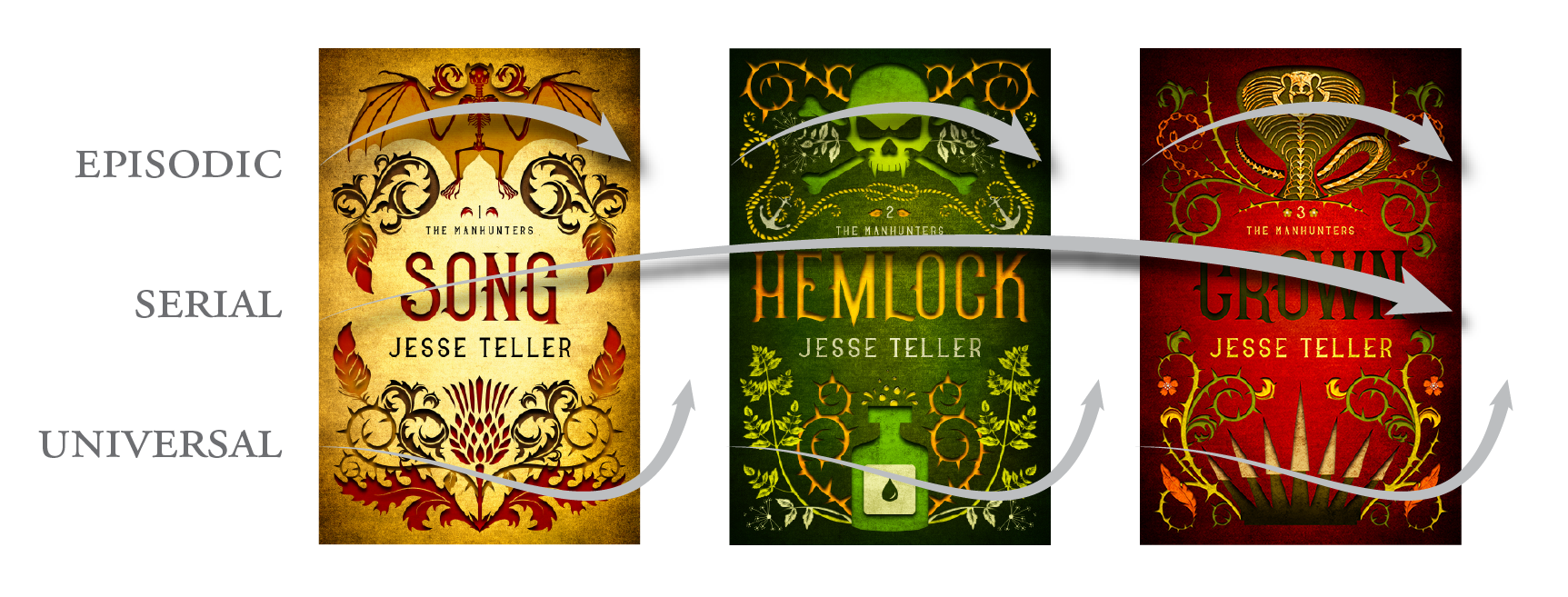
When I was telling the story of Rayph and his crew in the series The Manhunters, I had to think about it on a number of levels. Had to create a story that possessed many lengths and layers. There is a trick to this.
No one wants to read a story with no ending. When readers engage with a tale, they want to feel as if they have reached a climax and experience a sense of resolution within the book. This is more episodic in nature and is the main focus of the book.
In Song, we face a villain named Julius Kriss. We see the devastation he can wreak, and the main point in the novel is to defeat this villain and his allies. He is formidable and it takes every trick in the Manhunters’ handbook to stand against him. But when the book is over, this string of story has been tied off. For better or worse, we have dealt with Julius and his tale has come to an end. This is the episodic thread, and every book should have one.
The main climax is found here. The reader must experience the victory or defeat of this enemy and every spectacle involved with them. This is why the reader has picked up this book. But in a series, the tale can’t end here.
In sitcoms of the sixties, seventies, eighties, and into the nineties, this sort of tale was the whole of what we saw. Nearly every episode of a show had a rise, a climax, and an end, with the next in the season separate entirely. There was no overarching tale that followed the viewer through to the next episode. The story had limited depth. This was a feature in many comic books and novels. This made it possible for a reader to pick up any book in the writer’s repertoire and find a complete story.
In the nineties, sitcoms began to extend the story through into the next episode, and the season climax began to form.
This is the main goal of a series. In a series, an expansive story needs to be told. Elements within the tale need to go unresolved and follow us through into the next book.
In The Manhunters series, Rayph is an exile from his homeland and aches to return home. He has no way of accomplishing that because of events beyond his control and he finds that ache haunting his life and leaving him empty. This story line must find resolution by the end of the series. If I fill my character with a need, by the end of the series I must fulfill it.
In addition to Rayph’s exile, we have a quest woven through the series in the curse of the Thorn Brothers, as well as a conflict with Smear’s growing anxiety when his love is in danger. We see the struggle with the throne Rayph is embroiled in, and a few other hidden threads woven in the telling of the tale.
These story elements are serial. These bits of story cannot be resolved in one book. They bind us to the next book and the next. They carry us through into the rest of the series and give readers the urge to follow along so they might see how these things come about. This is crucial to the series and is the lifeblood of the modern way of storytelling.
But there is as well a third level of a series, a level of story that brings readers back to our work at large, and can also be seen in the meat of The Manhunters series, and that is the universal thread. There may be another name for it, something that hints at a wider story that expands to the rest of the world, but here I’m using the term universal.
This is the tale beyond the tale, characters introduced who go on to do other things. They branch off this story and reach into a growing land that exists beyond the series itself.
In Song, we see Konnon heading off to a fate we are unaware of. We know Bree has dreamt of a redheaded girl who will come and awaken her to a destiny beyond the Manhunters.
In Hemlock, Aaron the Marked has a goal beyond the defeat of Tristan and Kat and is driven to find his king Peter Redfist and serve the higher cause. Even though he is given horrible news about the fate awaiting him, he still heads off into the jaws of it to reach an end he cannot escape and cannot stave off.
Crown introduces the Callden Collective and shows the beginning of a great war their coven must face in the future. We are not privy to the ramifications of that war nor its end.
When The Manhunters series concludes, it is obvious to readers that a world goes on beyond what we have seen and a larger overarching story is just getting started.
Leave a comment